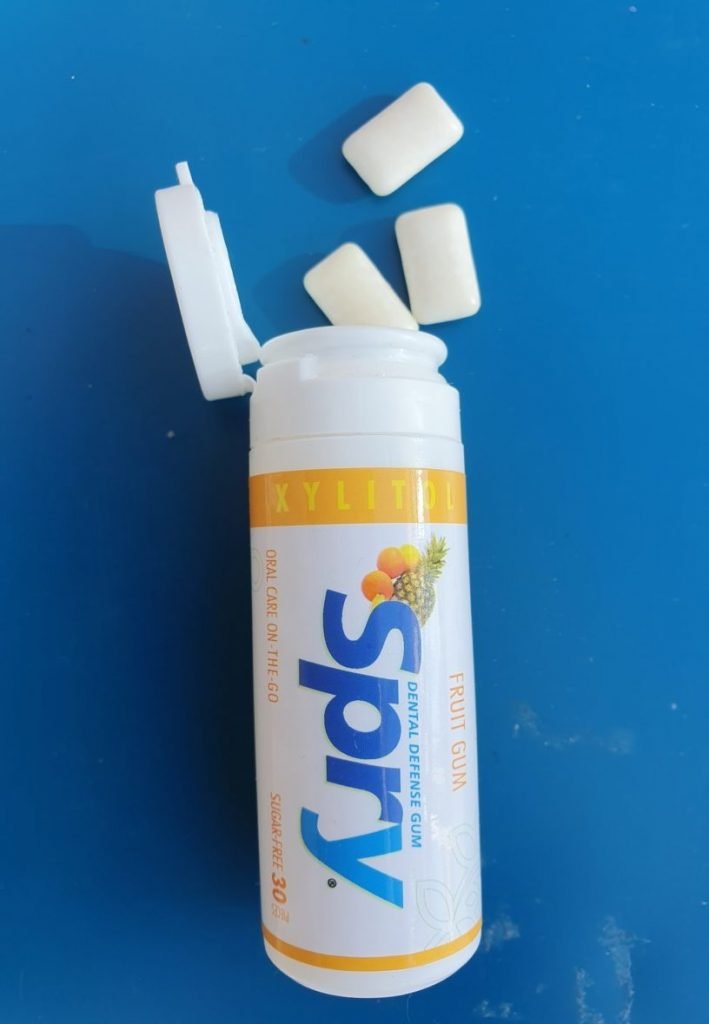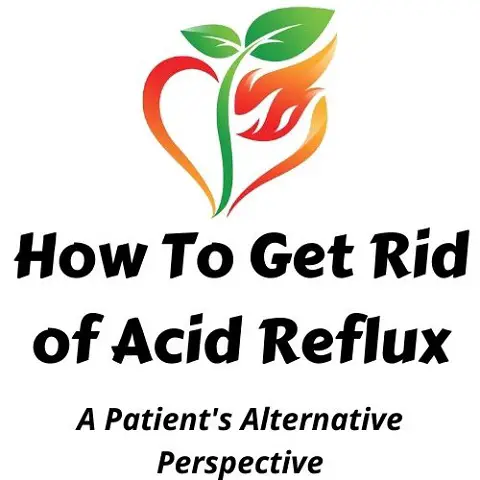Any links on this page that lead to products on Amazon and other companies may be affiliate links and we earn a commission if you make a qualifying purchase. Thanks in advance for your support!
There is lots of hype about natural remedies for heartburn and acid reflux and chewing gum often features. But does it really get rid of heartburn?
Yes, it can do. A number of small scale reputable studies, in 2001, 2005, and 2015, have shown that chewing gum can be effective in regulating the effects of acid reflux and heartburn. But some gums are better than others.
Read on below to find out more about the how this works, the limitations, and the best type of gum to use…
Night time reflux? Read how to avoid it here
- Acid Reflux
- What Is The Proof That Chewing Gum Helps With Acid Reflux?
- Why Does Gum Help Acid Reflux?
- What Gum Is Best For Acid Reflux
- Some Users’ Experiences of Gum With Acid Reflux
- What Is Chewing Gum Made Of?
- What Are The Advantages Of Chewing Gum?
- Is It Harmful To Swallow Gum?
- Does chewing gum cause gas and bloating?
- Does Chewing Gum Increase Stomach Acid?
- Can chewing gum upset your stomach?
- Conclusions on Chewing Gum To Get Rid Of Heartburn
Night time reflux? Read how to avoid it here
Acid Reflux
Acid reflux, or heartburn, describes a burning sensation which affects an awful lot of people, including babies, children, teenagers, pregnant women and many older adults.
Although a lot of people suffer it at sometime in their lives, it’s often transient, and will only re-occur infrequently.
However, in a proportion of people it is a fact of life, and rears its ugly head regularly and frequently. In this case it has acquired the name Gastro Esophageal Reflux Disease or GERD (or Gastro Oesophageal Reflux Disease – GORD – in the UK). This disease is very common – A 2014 systematic review estimates from 15.1 to 30 percent of the U.S. population has GERD.
The symptoms are outlined in this article, here. Some ways of dealing with it covered here. This article looks at one particular treatment for the symptoms, chewing gum. But just what is the proof that it’s any good?
Does Alkaline water help with reflux? Find out here
What Is The Proof That Chewing Gum Helps With Acid Reflux?
- A 2001 study (ref 1 at end of article) involved 40 individuals with laryngopharyngeal reflux (LPR) – this is a gaseous reflux which infiltrates the airways. The data show that gum chewing consistently reduced acid reflux, and that bicarbonate gum caused greater increases in reduction than regular gum. For patients with LPR, chewing gum appears to be a useful addition to anti-reflux therapy.
- A further 2001 study (ref 3 below) investigated whether walking or gum chewing affect meal-induced reflux. 36 participants were tested after breakfast following both chewing gum and walking. Chewing gum for 1 h after the meal reduced the acid contact time in both groups, with a more profound effect in refluxers than in controls. Walking was less effective. The study concluded that chewing gum after a meal helps to reduce esophageal acid exposure.
- A study in 2005 (ref 2 below) involved 31 subjects presenting with symptoms of reflux who were given a refluxogenic meal (a meal causing reflux) twice and were randomly selected to chew gum for half an hour after eating the meal. The study found chewing sugar-free gum for half an hour after a meal can reduce acidic esophageal reflux.
- A 2015 study (ref 4 below) tested GutsyGum, a chewing gum developed to tackle the symptoms of acid reflux. It contains calcium carbonate, licorice extract, papain, and apple cider vinegar. 24 subjects with acid reflux consumed either GutsyGum or a placebo gum. The conclusions were that GutsyGum is more effective than a placebo gum in alleviating primary symptoms of heartburn and acid reflux. Unfortunately GutsyGum seems not to be available any more, but there are alternatives – see below.
Why Does Gum Help Acid Reflux?
Chewing on a piece of gum helps flood the esophagus with alkaline saliva, neutralizing and diluting acids that cause the characteristic burning sensations.
Chewing gum also helps to induce increased swallowing frequency, thus improving the clearance rate of reflux within the esophagus.
So, what gum is beat for heartburn and acid reflux?
Read more about how antacids work to relieve reflux here
What Gum Is Best For Acid Reflux
There now seems to be no doubt that there are benefits in chewing gum for heartburn. But which type of gum should you choose?
Is Spearmint Gum Bad For Heartburn?
Mint is generally on the list of foods which should be avoided by acid reflux sufferers. However, this is a very personal reaction; usually, it is not a “trigger” food for me, but it seems to be for a lot of people, if their reactions on social media is anything to go by.
One curious anomaly is that a gum which is highly regarded by its users, and aimed at reflux sufferers, Chooz, is peppermint based. More on this later…
Sign up to our newsletter for news on reflux and heartburn!
Sugar free Gum
It’s generally accepted that it is best to use sugar free gum, as the alternative – those gums containing sugar – are not good for our teeth. However, to make the gum acceptable to the chewer, the gum should contain either natural sugar substitutes, or artificial substitutes.
Natural Sugar Substitutes – these come from fruits and include sugar alcohols such as stevia, xylitol, sorbitol, maltitol, mannitol, and isomalt. The most common sugar substitutes found in sugar free gum are xylitol and sorbitol.
Artificial Sugar Substitutes – these include Aspartame which is one of the most controversial sweeteners in the world. It is claimed to cause health problems ranging from headaches to cancer. On the other hand, food safety authorities and other mainstream sources consider it to be safe.
Xylitol Gum For Acid Reflux
There are now quite a few gums on the market which contain Xylitol as a sweetener.
Xylitol is found naturally in many fruits and vegetables, and in birch wood. It is wise to keep it away from your dog, as it can be toxic.
One study (ref 7 below) found that a chewing gum that contains the sweetener xylitol temporarily retarded the growth of bacteria that cause tooth decay.
Xylitol decreases the incidence of dental caries by increasing salivary flow and reducing the number of bacteria (including the bacteria associated with reflux which is found in the stomach – Helicobacter pylori), plaque levels, gingival inflammation, and erosion of teeth.
For more on xylitol gum – including the one I use – see below.

I have used gum for years to ease my acid reflux, and in that time I think I’ve tried most types and brands.
The brand I’ve settled on is Spry’s Fruit Gum, shown on the left.
I chose this one because it’s:
- Not mint – some people have problems with mint causing reflux (but see Chooz below).
- Xylitol based – as mentioned above, xylitol has been shown to positively assist in maintaining healthy teeth, and is a natural sweetener.
- It contains calcium carbonate, the main ingredient in Tums, which is specifically aimed at treating heartburn.
- Got a nice fruity taste – as you will see, probably the main criticism of this gum is that it loses its’ flavor quickly. It does, but I don’t mind that, as I still have the pleasant taste in my mouth for some time.
- It has good reviews on Amazon (apart from the comments about how quickly the fruit flavor disappears).
More details, and reviews about Spry’s Fruit Gum can be found here (US), here (UK), and here (Ca).
Bicarbonate Gum For Acid Reflux
A small study in 2016 (ref 8 below) with 30 volunteers, showed that chewing gum containing bicarbonate is more effective in reducing acidity than ordinary gum.
Bicarbonate or calcium carbonate is often used as a quick, home remedy for the burning sensation of reflux, and is a basic ingredient of Tums and Rennies. Some gums use this as an ingredient; one such brand is Chooz.
Chooz is promoted as being designed for treating heartburn. This is surprisingly a peppermint based gum surprising because mint is often quoted as a “trigger” for heartburn and acid reflux) with xylitol – but it also contains the artificial sweetener aspartame, which, as outlined below, has a mixed reputation and associated with health risks – although US and UK health authorities consider it safe.
Having said that, at the time of writing, the reviews on Amazon were very good. These can be seen here (US) and here (Ca); Currently it’s not available in the UK.
Ginger Gum For Acid Reflux
Ginger is widely accepted as a stomach calmer and in particular a help for reflux symptoms.

One brand which offers ginger together with a variety of other flavors (one of which is fennel, which is also considered helpful in controlling the symptoms of acid reflux) is Simply Gum.
It also boasts a healthy natural ingredient mix, including no synthetics, no artificial flavors, no preservatives, and especially no aspartame. It is biodegradable, so won’t stay around for the next 1,000 years.
However, it contains no xylitol, which I think is probably a negative, given the benefits of this natural sweetener.
The reviews on Amazon (over 4,000 of them) are very good. You can see them here (US), or here (UK), or here (Ca).
I use this gum, and I find it very pleasant, with the flavor lasting quite a long time. I like the fact that it is biodegradable, and the fact that they supply, in the box, wrappers for disposing of the gum hygienically.
Some Users’ Experiences of Gum With Acid Reflux
The only comfort i get is from chewing gum and laying on my left side. Just wish i didnt get it while i was at working, making my life difficult at the min
Facebook group
I drink water and chew gum. Chewing gum helps digest your food which helps it for me.
Facebook group
Most of the time chewing gum helps me. Got an endoscopy and they found nothing wrong with my esophagus but do have an ulcer. But chewing gum is saves me most of the time.
Facebook group

What Is Chewing Gum Made Of?
Evidence of chewing gum use stretches as far back as the Neolithic period – 6,000 years ago – complete with tooth marks. This was birch bark tar, and was thought to have antiseptic properties.
Many other civilizations and cultures through the ages have used a wide variety of substances to make gum, including plants, grasses and tree resins, such as mastic and chicle.

Chicle, for example, is the latex sap from the sapodilla tree. It is basically the same thing as natural rubber. It doesn’t break down, even with lots of chewing.
Modern gum is made up of resin (for chewing), wax (to soften the resin), and elastomer (for flexibility), plus sweeteners, glycerine (moistness), a plasticizer, flavors and coloring’s. The crunchy outer coating on some gums is made of a substance called polyols.
Don’t recoil in horror at the thought of putting all this into your mouth, though. it is a pretty inert and benign substance and does have significant benefits (Unless you dispose of it on to a busy sidewalk, in which case it will have serious side effects on other people). Here are some general advantages of chewing gum:
What Are The Advantages Of Chewing Gum?
The proven benefits of chewing gum include reducing acidity in the esophagus, reducing dental decay and plaque, desensitizing teeth, and strengthening tooth enamel.
So are there any disadvantages of chewing gum? Here are a few questions people often ask:
Is It Harmful To Swallow Gum?
No, it is not harmful as long as you don’t swallow lots of it. Gum doesn’t breakdown while chewing it, and it remains intact while in your stomach, despite strong acid and the churning movement. If you swallow gum it’s not going to change much from the mouth to the end of the journey…
As long as it doesn’t clump up in giant multicolored balls of poop, gum passes through the system in less than a week.
However, depending on how much of it is in there, gum could be problematical.
There is no evidence to show how much swallowed gum is too much, but there are some case studies showing that swallowing gum could gum up the works.
Does chewing gum cause gas and bloating?
In a small study conducted in 2015, gum chewing did not increase or decrease the frequency of gastric or supragastric belches, but did increase saliva swallowing.
Gastric belches involves venting of swallowed air. Supragastric belching occurs when swallowed air does not reach the stomach and returns by mouth a short time after swallowing.
The 2015 study (ref 5 below) involved 16 patients with complaint of troublesome belching and 15 controls.
Does Chewing Gum Increase Stomach Acid?
An early study of 15 individuals concluded that although chewing gum causes a stimulation of the gastric acid secretion, this increase is so small that it does not justify an advice against the use of chewing gum in patients with duodenal ulcer or x-ray negative dyspepsia.
The study in 1972 (ref 6 below) titled “Effect of Chewing Gum on Gastric Acid Secretion” found that there was no doubt that chewing increased acid in the stomach (which is why we’re able to digest our food after all), it was relatively small.
Can chewing gum upset your stomach?
Chewing, and even swallowing, the gum itself won’t necessarily upset your stomach, but the ingredients in it may not agree with some. Some of the sugar-free ingredients can cause an upset stomach and diarrhea (i.e. sorbitol, mannitol, xylitol) if consumed in excess.
Also some people can be allergic to certain flavors, eg mint, which could possibly upset your stomach as well.
Conclusions on Chewing Gum To Get Rid Of Heartburn
Well, the evidence seems to be overwhelming, that chewing gum does help to get rid of heartburn and provide other benefits too. But not all gums are made equal, and you should choose your gum with care, avoiding those with sugar, and probably mint. Instead try one with natural sweeteners, such as Xylitol.

Leave a Reply